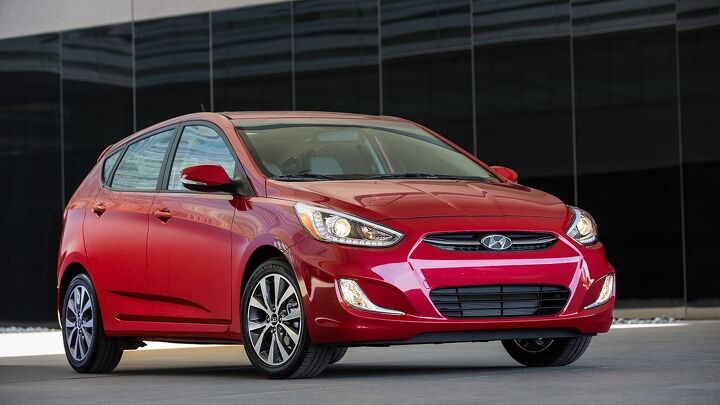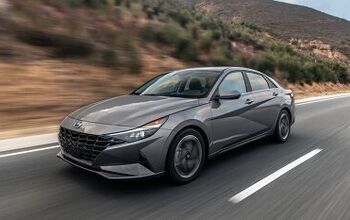Fire Risk: Hyundai and Kia Recall More Than Three Million Vehicles

Though EV fires receive a tremendous amount of attention in the news, they are far less common proportionally than gas vehicle fires. Sure, we’ve seen a few massive recalls for EV fires in recent years, including a massive campaign involving every Chevy Bolt and Bolt EUV made between 2017 and 2023, but gas vehicles are still more likely to catch fire. Hyundai and Kia are the latest manufacturers to issue a fire-related recall, this time for millions of gas vehicles with faulty hydraulic electronic control units (HECU) and antilock brake modules.
The affected Kia vehicles’ HECUs can experience an electrical short as they age, which causes excess electrical current, increasing the fire risk. The automaker said the exact cause of the short is unknown but noted that fires could occur when the vehicle is parked or in use. In total, the recall wrapped up more than three million vehicles from both automakers, with around 1.7 million Kias and 1.6 million Hyundais.
Kia’s recalling several models, including:
· 2010-2019 Borrego
· 2014-2016 Cadenza
· 2010-2013 Forte (includes Koup)
· 2010-2013 Sportage
· 2015-2018 K900
· 2011-2015 Optima (2011-2013 Optima Hybrid)
· 2011-2013 Soul
· 2012-2017 Rio
· 2010-2011 Rondo
· 2011-2014 Sorento
While fire-related, Hyundai’s recall is due to issues with the antilock brake system module. Similar to Kia’s HECU problems, the ABS in some Hyundai models can experience an electrical overcurrent, increasing the fire risk. Recall documentation states that the O-ring material in the ABS can be damaged over time, allowing brake fluid to leak onto electrical components.
The list of Hyundai models involved in the recall includes:
· 2012-2015 Accent
· 2012-2015 Azera
· 2011-2015 Elantra
· 2011-2015 Genesis Coupe (prior to Genesis becoming a separate brand)
· 2011-2015 Sonata Hybrid
· 2012-2015 Veloster
· 2010-2012 Veracruz
· 2013 Santa Fe Sport
· 2014-2015 Equus
· 2013-2015 Santa Fe
· 2010-2013 Tucson
Hyundai said it is aware of 21 fires and 22 “thermal incidents” (sounds a lot like a fire) related to the problem. Both automakers noted that owners can continue driving their vehicles but advised that they must be parked outside and away from structures. Kia dealers will replace the HECU unit if required, and Hyundai stores will replace ABS fuses if there is a problem.
[Image: Hyundai]
Become a TTAC insider. Get the latest news, features, TTAC takes, and everything else that gets to the truth about cars first by subscribing to our newsletter.

Chris grew up in, under, and around cars, but took the long way around to becoming an automotive writer. After a career in technology consulting and a trip through business school, Chris began writing about the automotive industry as a way to reconnect with his passion and get behind the wheel of a new car every week. He focuses on taking complex industry stories and making them digestible by any reader. Just don’t expect him to stay away from high-mileage Porsches.
More by Chris Teague
Latest Car Reviews
Read moreLatest Product Reviews
Read moreRecent Comments
- Slavuta Autonomous cars can be used by terrorists.
- W Conrad I'm not afraid of them, but they aren't needed for everyone or everywhere. Long haul and highway driving sure, but in the city, nope.
- Jalop1991 In a manner similar to PHEV being the correct answer, I declare RPVs to be the correct answer here.We're doing it with certain aircraft; why not with cars on the ground, using hardware and tools like Telsa's "FSD" or GM's "SuperCruise" as the base?Take the local Uber driver out of the car, and put him in a professional centralized environment from where he drives me around. The system and the individual car can have awareness as well as gates, but he's responsible for the driving.Put the tech into my car, and let me buy it as needed. I need someone else to drive me home; hit the button and voila, I've hired a driver for the moment. I don't want to drive 11 hours to my vacation spot; hire the remote pilot for that. When I get there, I have my car and he's still at his normal location, piloting cars for other people.The system would allow for driver rest period, like what's required for truckers, so I might end up with multiple people driving me to the coast. I don't care. And they don't have to be physically with me, therefore they can be way cheaper.Charge taxi-type per-mile rates. For long drives, offer per-trip rates. Offer subscriptions, including miles/hours. Whatever.(And for grins, dress the remote pilots all as Johnnie.)Start this out with big rigs. Take the trucker away from the long haul driving, and let him be there for emergencies and the short haul parts of the trip.And in a manner similar to PHEVs being discredited, I fully expect to be razzed for this brilliant idea (not unlike how Alan Kay wasn't recognized until many many years later for his Dynabook vision).
- B-BodyBuick84 Not afraid of AV's as I highly doubt they will ever be %100 viable for our roads. Stop-and-go downtown city or rush hour highway traffic? I can see that, but otherwise there's simply too many variables. Bad weather conditions, faded road lines or markings, reflective surfaces with glare, etc. There's also the issue of cultural norms. About a decade ago there was actually an online test called 'The Morality Machine' one could do online where you were in control of an AV and choose what action to take when a crash was inevitable. I think something like 2.5 million people across the world participated? For example, do you hit and most likely kill the elderly couple strolling across the crosswalk or crash the vehicle into a cement barrier and almost certainly cause the death of the vehicle occupants? What if it's a parent and child? In N. America 98% of people choose to hit the elderly couple and save themselves while in Asia, the exact opposite happened where 98% choose to hit the parent and child. Why? Cultural differences. Asia puts a lot of emphasis on respecting their elderly while N. America has a culture of 'save/ protect the children'. Are these AV's going to respect that culture? Is a VW Jetta or Buick Envision AV going to have different programming depending on whether it's sold in Canada or Taiwan? how's that going to effect legislation and legal battles when a crash inevitibly does happen? These are the true barriers to mass AV adoption, and in the 10 years since that test came out, there has been zero answers or progress on this matter. So no, I'm not afraid of AV's simply because with the exception of a few specific situations, most avenues are going to prove to be a dead-end for automakers.
- Mike Bradley Autonomous cars were developed in Silicon Valley. For new products there, the standard business plan is to put a barely-functioning product on the market right away and wait for the early-adopter customers to find the flaws. That's exactly what's happened. Detroit's plan is pretty much the opposite, but Detroit isn't developing this product. That's why dealers, for instance, haven't been trained in the cars.


































Comments
Join the conversation
Good news is that based on the model years many of these have already been junked or experienced terminal engine failure.
I just buy a Hyndai Elantra SEL, and My car started to have issues with the AC dont work the air sometimes is really hot and later cold and also I heard a noice in the engine so I went to the dealer for the first service and explain what was hapenning to the AC they told me that the car was getting hot because the vent is not working I didnt know that the car was getting hot because it doesnt show nothing no sign no beep nothing I was surprise and also I notice that it needed engine oil, I think that something is wrong with this car because is a model 23 and I just got it on April only 5 months use. is this normal ? Also my daughter bought the same model and she went for a trip and the car also got hot and it didnt show up in the system she called them and they said to take the car to the dealer for a check up I think that if the cars are new they shouldnt be having this problems.